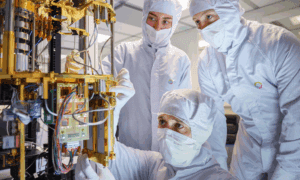The world is moving fast towards a new computing era. Quantum computing is leading this change, offering incredible power to process information. Photonics, the study of light, is key to unlocking this power.
Quantum computing uses special particles to solve problems much faster than today’s computers. It’s like a superpower for computers. But, it needs photonics to reach its full potential, and Europe’s Quantum Computer is leading the way in this transformation.
Key Takeaways
- Quantum computing is the next frontier in information processing, offering exponential computational power.
- Photonics, the science of light, is revolutionizing the field of quantum computing by unlocking its full potential.
- Photonic quantum computing promises increased speed, efficiency, and enhanced security and encryption.
- Rapid advancements are being made in the development of photonic quantum computing, with diverse applications in various industries.
- While challenges in scalability and error correction remain, the future of photonic quantum computing is incredibly promising.
Quantum Computing: The Future of Computing
Classical computing is facing its limits, and everyone is looking forward to quantum computing. This new tech could change how we process information and solve problems.
The Limitations of Classical Computing
Classical computers work well with simple tasks but struggle with complex ones. They can’t handle tasks like cryptography, materials science, and drug discovery very well. This is because they’re based on old physics and can only process information in a linear way.
The Potential of Quantum Computing
Quantum computing uses quantum mechanics to open up new possibilities. Quantum computers use qubits, not regular bits, to solve problems much faster. They can do this because of quantum properties like superposition and entanglement.
Quantum computers can solve problems that classical computers can’t. They can tackle tough tasks in fields like cryptography, materials science, and drug discovery. This means they could change many industries and lead to new discoveries.
“Quantum computing is the future of computing, and it has the potential to solve problems that are impossible for classical computers to solve.”
Photonics: The Key to Unlocking Quantum Computing
Quantum computing is on the horizon, and photonics is key. Light’s unique qualities make it essential for quantum computing. It helps create systems that are both scalable and efficient.
Photonic systems are great for making and managing qubits. Qubits are like super-powerful bits that can do lots of things at once. This lets quantum computers solve problems much faster than regular computers.
Photonic quantum computing can solve big problems that regular computers can’t. It’s perfect for tasks like breaking codes, finding new medicines, and predicting the weather. This makes it a game-changer in many fields.
| Advantages of Photonic Quantum Computing | Limitations of Classical Computing |
|
|
The fields of photonics and quantum computing are coming together. This could lead to huge breakthroughs in solving problems. With light’s power, quantum computing is set to make a big leap forward.
Revolutionizing Quantum Computing with Photonics
The mix of photonics and quantum computing is changing the game. It’s making computers faster and better at handling information. This is thanks to photons, which are special particles that carry light.
Photons help make photonic quantum computing possible. This tech is faster than old computers because it uses light. It’s like a super-fast highway for information.
“Photonic quantum computing is poised to redefine the boundaries of computational power, ushering in a future where information processing is faster, more secure, and more scalable than ever before.”
Photonic quantum computers can do complex tasks quickly and accurately. They’re great for things like making new medicines and understanding the weather. This is because they use light in a special way.
The quantum computing revolution is growing fast. Photonics is a key part of this change. It’s making computers better and changing how we see the world.
| Key Advantages of Photonic Quantum Computing | Traditional Electronic-based Quantum Computing |
|
|
The Advantages of Photonic Quantum Computing
Photonic quantum computing is changing the game in quantum technology. It uses light to offer speed, efficiency, and security benefits. This new approach is set to open up new possibilities in many areas.
Increased Speed and Efficiency
Photonic quantum computing is incredibly fast and efficient. Light-based systems can handle complex tasks quickly. This means they can solve problems much faster than traditional computers.
Enhanced Security and Encryption
It also brings better security and encryption. Light’s unique properties make it hard to intercept or hack. This is crucial for keeping data safe in the digital world.
| Advantage | Benefit |
| Increased Speed and Efficiency | Accelerates complex computations and simulations |
| Enhanced Security and Encryption | Provides robust protection against cyber threats and data breaches |
As photonic quantum computing grows, it will change many fields. It will improve scientific research, secure communications, and more.
“The future of computing lies in the fusion of light and quantum mechanics, unlocking unprecedented levels of speed, efficiency, and security.”
Current Developments in Photonic Quantum Computing
The field of photonic quantum computing is seeing a lot of exciting progress. Scientists worldwide are exploring new ways to use light in quantum technology. This is helping to move this field forward.
One big area of focus is on integrated photonic circuits. These small, chip-based systems are key for making photonic quantum computers work. Researchers are finding new ways to put photonic parts together on one chip. This makes quantum devices smaller and more efficient.
There’s also been a lot of work on better photon sources and detectors. These are important for photonic quantum systems. Thanks to new ways to create and detect single photons, scientists can now control quantum information better.
Another area getting a lot of attention is hybrid quantum systems. Here, photonic tech is mixed with other quantum platforms like superconducting circuits or trapped ions. This mix aims to use the best of each system for better quantum computing and communication.
Top research places and tech companies are leading these advances in photonic quantum computing. From university labs to industry R&D, everyone is working together. Their efforts are bringing us closer to real, big quantum technology solutions.
As the field keeps growing, we’ll see even more amazing developments ahead. This will bring us closer to a future powered by quantum technology.
The Challenges of Photonic Quantum Computing
Photonic quantum computing is growing fast, but it faces big challenges. The main hurdles are scalability and error correction.
Scalability: Expanding the Quantum Realm
Scaling up photonic quantum computing is tough. It’s hard to add more qubits while keeping them stable and controlled. Making a big system with many parts like waveguides and detectors is a big task.
Error Correction: Safeguarding Quantum Integrity
Quantum systems are very sensitive to noise and interference. This can mess up the calculations. Finding good ways to fix errors is key to making photonic quantum computing reliable.
Beating these challenges is key for photonic quantum computing to become useful. Solving scalability and error correction will unlock its full power in quantum technology.
“The challenges of photonic quantum computing are not insurmountable, but they require a concerted effort from the scientific community to overcome.”
Applications of Photonic Quantum Computing
Photonic quantum computing is changing many industries. It offers new ways to solve complex problems. This technology is key in cryptography, cybersecurity, simulation, and modeling, leading to big leaps forward.
Cryptography and Cybersecurity
Photonic quantum computing makes data safer than ever before. It uses quantum mechanics to create secure encryption. This means our sensitive information is protected from cyber threats.
It can send encryption keys that hackers can’t crack. This is a major win for cybersecurity.
Simulation and Modeling
This technology is great for complex system analysis. It helps find new solutions in fields like materials science and drug discovery. It also improves climate modeling and financial forecasting.
Photonic quantum computing uses quantum mechanics to give deep insights. This leads to major breakthroughs.
| Application | Benefit |
| Cryptography and Cybersecurity | Unbreakable encryption, unhackable communication, and robust data protection |
| Simulation and Modeling | Unprecedented computational power, efficient analysis of complex systems, and innovative problem-solving |
Photonic quantum computing is getting better, opening up new areas. It’s making data safer and helping us discover new things. This technology is changing industries and opening up new possibilities.
The Future of Photonic Quantum Computing
Technology is always changing, and photonic quantum computing is no exception. Scientists are working hard to make this technology even better. They aim to change how we compute forever.
One big thing about photonic quantum computing is how fast and efficient it can be. It uses light in a special way. This makes it better than old computers for many tasks, like keeping data safe and solving hard problems.
This technology could also change many industries. It could help in healthcare, finance, and more. Quantum computing could lead to new discoveries and ways to solve problems.
“The future of photonic quantum computing is a thrilling prospect, one that holds the potential to transform the very foundations of technology as we know it.”
Scientists are excited about what photonic quantum computing can do. It could make computers faster and more secure. It might even lead to new uses we can’t imagine yet.
But, there are still challenges to overcome. Like making it bigger and fixing mistakes. Still, scientists are making progress. They’re working towards a future where photonic quantum computing is real.
Conclusion
Photonics is key to unlocking quantum computing’s full potential. It uses light’s unique properties to offer speed, efficiency, and security. This is better than classical computing.
We’ve seen how classical computing has its limits. Quantum technology, especially with photonics, promises a lot. It’s changing fields like cryptography, cybersecurity, and scientific modeling.
The field of photonic quantum computing is growing fast. We’ll see big changes soon. Challenges like making it bigger and fixing errors are being worked on. This will make photonic quantum computing a big deal in our future.
FAQ
What is photonic quantum computing?
Photonic quantum computing uses light to develop quantum computers. It creates and controls quantum bits, or qubits, which are the heart of quantum computers.
What are the advantages of photonic quantum computing?
It’s faster and more efficient. It also offers better security and encryption. Plus, it could lead to more reliable quantum computers.
How is photonics revolutionizing the field of quantum computing?
Photonics brings new speed, accuracy, and scalability to quantum computing. It’s changing how we process and share information.
What are the current developments in photonic quantum computing?
Researchers are making big strides in photonic quantum computing. They’re working on making it bigger, more accurate, and practical.
What are the challenges facing photonic quantum computing?
Scaling up and fixing errors are big challenges. But, overcoming these will help build powerful quantum computers.
What are the potential applications of photonic quantum computing?
It’s great for security and encryption. It also helps in simulating complex systems. This could lead to new solutions and innovations.
What is the future of photonic quantum computing?
The future looks bright for photonic quantum computing. It could make computers much more powerful. This could change many industries and create new opportunities.



































